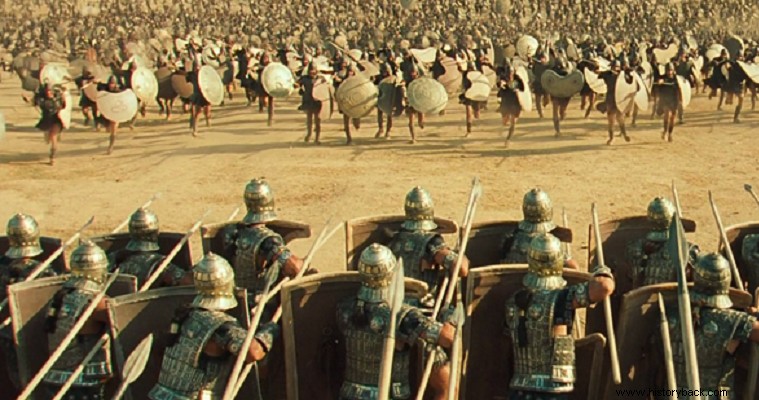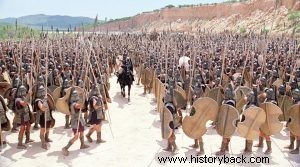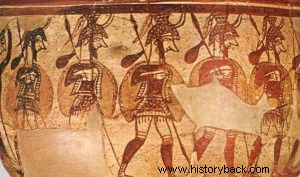
After the settlement of the Achaeans on the Trojan coast, the conflict between Agamemnon and Achilles occurred, if it occurred at all. Therefore, either because the conflict actually took place, or because it was a strategic choice of the general, Achilles and his terrible Myrmidons, would not take part in the first two battles on the Scamandrian field. They took part, led by Patroclus, in the third battle and led by Achilles in the fourth and most important battle.
The Myrmidons, as elite as they were, are very likely to have simply formed the general reserve of the Achaean army. On another view the Myrmidons did not take part in the first two battles because they may simply have been operating elsewhere. Before the start of the first battle, it is decided to decide the campaign by a duel between Paris and Menelaus, the two interested in Helen. Paris is defeated but saved. This event temporarily caused confusion in the ranks of the Achaeans, which the Trojans took advantage of and "squadrons of shield-bearers" rushed against them.
The first battle
Agamemnon restored order to his divisions and then inspected and encouraged his men before ordering them into battle. Homer's description at this point is indeed amazing. Agamemnon marches before the arrayed phalanxes of his thousands of warriors. The sun glows golden on their mounts and their spears form a forest of spikes. Homer also informs us about the way the Achaeans lined up. In front were the light infantry, followed by the chariots and behind them the infantry phalanxes, forming the classic triple Mycenaean line of battle. The fact that the light infantry were in the first line is confirmed by the exchange of "fire" that took place.
As for the chariots, it seems that in this particular battle they lined up and fought under the instructions of the old knight Nestor. "Let no one in chivalry and valor having conviction alone before the others rush to the Trojans to fight, do not retreat, for you will be more vulnerable. And whoever from his own vehicle reaches another chariot, let him strike it with his spear, because it is much better that way. In this way the ancients built cities and walls, having this mind and soul in their breasts" (D 303-309, mtf. K. Doukas).
Nestor's words clearly show his desire to see the Achaean charioteers charge in formation against the enemy, seeking to approach the enemy within striking distance of a long spear. This tactic was verified in use by the Greek armies, at least from the 16th century BC. Nestor hoped to cause a breach in the enemy line with a massive and organized advance of his chariots, the results of which would be exploited by the friendly infantry. After the execution of the preparatory maneuvers the battle became general. The infantry phalanxes collided "and blood flowed on the ground". But none of the opponents gained a tactical advantage.
So it was decided to decide the result by a new duel, this time between Telamonius Aedas and Hector. The new duel ended unopposed and due to the coming of night the two armies withdrew, the Achaeans to their camp and the Trojans to the walls of their city. This first battle of the Iliad must have taken place near the walls. Otherwise it would not have been possible for Priam and Helen to have eye contact with the Achaean battle lines and to be able to distinguish even the faces of the combatants, as Homer mentions.
The Mycenaean Army should have also crossed the Simoi river, which flowed almost in the middle of the Trojan plain, and fought the Trojans with the river to its south. This was a serious disadvantage, but one which the Trojans do not seem to have been able to exploit. However, the Achaeans, after collecting their dead, retired to their camp and buried them in a mound.
The second battle
The next day the battle resumed. Despite the heroism and losses of both opposing armies, the victory did not lean towards either side. At noon, however, the Trojans pressed the Achaeans and forced them to retreat. The frightened Achaeans were confined to their camp, while the victorious Trojans spent the night on the battlefield, not far from the enemy camp. Their leader Hector waited for daylight to attack the Achaeans again and crush them. This second and almost disastrous battle for the Achaeans was fought near their camp. But why did the war-experienced Achaeans concede the advantage of space to the enemy? Did they not expect an immediate repetition of the conflict, or were they surprised by the speed of the Trojan approach?
According to the Iliad, the Trojans are seen leaving their city at the first light of day. At twilight they had therefore marched to a distance of 6 km from their walls, to take up battle positions in the most favorable location for them, between the Kallikolon hill and the bend of the Skamandros river. At this point the width of the plain is limited and reaches a length of just 5 km. It makes sense that the outnumbered Trojans would want to face twice their opponents on the narrowest possible front. The Achaeans moved against them and until noon they tried, unsuccessfully, to break the enemy front.
The attrition race, naturally, caused fatigue and irritation in addition to losses. The result of this was the retreat of the Achaeans, in the Trojan counterattack. The situation soon became critical for the Achaeans, who stopped their flight only when the commander-in-chief Agamemnon shouted the famous "Aedos Argives" . That night no one could sleep. The Trojans were encamped on the plain, lighting 1,000 fires, visible from the Achaean camp. Agamemnon sent an embassy to Achilles asking for reinforcements. But he refused or was simply unable to help. However, it is rather strange to consider the participation in the battle of a detachment of only 2,500 men to be of decisive importance.
If 105,000 Achaeans could not overcome the Trojans, why would they do it reinforced by 2,500 men, however elite they were? At this point, there is definitely something more hidden than what it seems. What the Achaeans lacked was Achilles' strategic skills, which were repeatedly demonstrated in the fourth battle, and not his few men.
Night vision and Dolon
Agamemnon, sleepless and restless himself, called a night council of war and summoned all the leaders of the Achaeans. They then decided to send Odysseus and Diomedes, as a patrol, to spy out the enemy forces. Apparently, as can be concluded from the action of the two heroes, they were perhaps accompanied by a few more warriors. Homer gives us a detailed description of the equipment of the two heroes, which was light. This makes perfect sense if we consider the nature of their mission. The whole operation, however, proves how far the Mycenaeans had advanced in the art of war. Apparently patrolling and spying on enemy forces was an institution for the Mycenaean warriors.
In this way they gathered the necessary information about the positions and strength of the enemy, which they used later in the battle. And the homosexual Trojans had the same idea. By order of Hector, Dolon left the camp in order to reconnoitre the Achaean positions. However, the Achaean patrol apparently neutralized the Trojan and Dolon was captured and after giving information about the positions of his army was killed by Diomedes.
Based on Dolon's information, Odysseus and Diomedes moved against the enemy's extreme left horn, where the newly arrived Thracian allies of the Trojans had camped. The Achaeans moved silently against them and killed many of them in their sleep, including their king Rhesus, and they freed and took their horses. At some point, however, the Thracians realized what was happening and rallied. But it was too late. The bold Achaeans had taken refuge in their camp. The first historically recorded operation of unorthodox warfare had come to a happy end for the Achaeans.
The third battle
With the first light of day the two opposing armies were ready to clash again. From what is inferred from the Iliad, Hector again followed a similar plan to that which he had followed in the second battle. This time his army occupied an even narrower front, with its left horn covered by Scamander and its right by the hill of Neo Ilium .
Agamemnon repeated the same mistake of attacking the strong Trojan position, simultaneously, along the entire length of the enemy's front. Again a battle of attrition ensued, in which the numerical superiority of the Achaeans was of little avail. When the heads of the army were wounded and withdrawn from the battle, Agamemnon, Diomedes, Odysseus, the Achaeans were shaken and began to retreat. The Trojans then followed them and after regrouping and forming five assault phalanxes, attacked the fortified Achaean camp.
They even managed to enter it, breaking down the gates, knocking down part of the ramparts, but also simply following on foot the retreating Achaeans. Homer's description at this point is truly shocking, while at the same time astounding the reader with his knowledge of the art of war. The Trojans are shown forming a turtle with their shields, to avoid enemy projectiles from the ramparts. With the famous motto "you are an excellent omen for the defense of the fatherland" , Hector the Great and Sarpidon, led their men over the wall. A fierce battle would ensue around the ships.
Achilles returns
The battle was now on for good. Arrows, stones, flails and spears, sowed death. For a moment the Trojans were repulsed. However, they returned more fiercely and reached the ships of the Achaeans, attempting, mistakenly, to set fire to them. For a moment the battle raged fiercely. The two brothers, Aias and Teucros, the sons of Telamon bore the brunt of the battle for the Achaeans, fiercely defending the ships. However, the Trojans gradually prevail and begin to set fire to their ships of war.
The situation in the right horn of the Achaeans was developing particularly badly. There the defenses had almost collapsed and Protesilaus' ship was burning. At that critical moment, Patroclus appeared, bearing the weapons of Achilles and leading the Myrmidons, he marched and overthrew the disorganized Trojans. The Trojans, taken by surprise by this unexpected development, retreat almost to the walls of their city, where they regroup.
Again the extent of the surprise of the Trojans is astonishing. Why would the strategic Hector not have calculated any possible intervention of Achilles' forces, especially at the moment when, threatening to destroy the ships, he threatened the Achaeans with annihilation? Was there any chance, if the Myrmidons were present, that they would not intervene in favor of the particularly hard-pressed friendly forces? The answer is clearly no. If the Myrmidons were present, they would surely intervene, regardless of their leader's message.
Their intervention also took place on the threatened right Achaean horn, just in front of the proposed natural harbor used by the Achaeans. We know - from the New Catalog - that Achilles' forces were encamped at the left end of the Achaean camp. Why, then, did they not move straight ahead, where the defenses of the friendly forces held firm, so as to flank and literally annihilate the Trojan forces, but attacked the diametrically opposite point from which their camp was situated, and in haste at that? Did they attack immediately after disembarking from ships, returning from some other operation in Troad?
The death of Patroclus
However, the intervention of the Myrmidons temporarily saved the Achaeans. However, the anarchic pursuit of the Trojans to the walls of Ilium resulted in the cutting off of a part of the Myrmidons from the other friendly forces and the murder of their deputy leader Patroklos. According to the Homeric description, Patroclus initially moved his divisions along the left bank of the Scamandros river, thus ensuring his flank cover. But when they crossed Scamander's turnpike, the right of the Myrmidons was left uncovered. Apparently the Trojans took advantage of this weakness and counterattacked, cutting off Patroclus' section and killing him.
The Trojans then made an offensive return and confined the Achaeans to their camp. A little later night fell and the battle, the most critical, ceased. However, from a passage in the Iliad it is clear that the entire Myrmidon forces did not take part in the battle. Achilles says:"... but my partner I send with many Myrmidons to fight". So you should consider it possible that the whole of the Myrmidons were not present and therefore Achilles' soldiers did not all fight. It seems that the divisions of Achilles were gradually arriving on the battlefield, and due to the criticality of the situation they were immediately thrown into the conflict to support the threatened wing.
The attack of Patroklos should rather be seen as an extremely daring move, approaching the limits of self-sacrifice, which was aimed more at gaining time, in view of the arrival of the other Achaean forces and the concentrated counterattack of the Achaeans. strong> The coming of night brought relief to the Achaean camp. Achilles orders the body of the dead Patroclus to be treated and convenes a war council, which also hands him the master strategy for the upcoming fourth and final battle of the Iliad. The Mycenaeans had lunch, except for Achilles who was mourning the loss of his friend, and marched against the enemies.
The Catalytic Battle
Hector this time too would follow his classic, as successful as it had been until then, defense plan on a narrow front, where the numerical superiority of the wars would not benefit them in any way. So he arranged his army in the location between the hill of the new Ilium and the left bank of the Scamandros river. Opposite them stood the Achaeans, arrayed according to the shouts of Achilles. "... Now do not stand far from the Trojans, godly Achaeans, but stand man against man and fight with man. It is difficult for me, even if I am brave, to chase so many people and to fight them all...I will pierce the lines from one end to the other, and I don't think any of the Trojans will be happy, whoever comes near my spear", (Y 355-357 and 363-364).
So Achilles' battle plan was simple in conception and would prove brilliant in its execution. The aim of the first Achaean warrior was not to press the entire length of the enemy front, but to break it up at a pre-selected point. Achilles did not intend to wear down his army with pointless attacks.
He would concentrate his forces against the enemy's center and simply occupy the opposing horns. Should they succeed in breaking the enemy front, the left Trojan horn would be trapped between Scamander and the Xanthus River and the Achaean forces and would be destroyed. The next day the two armies were again facing each other and the plain shone with the brilliance of their weapons. The Trojans maintained a defensive posture and awaited the attack of their opponents. And the Achaeans did not disappoint them. Led by the formidable Achilles, the Achaean phalanxes charged into battle. The focus of the impact was the Trojan center.
The Trojans, unaccustomed to the new tactics, fought bravely, but did not manage to hold their front. After a fierce fight, their center was split and the men who made up the right wing, led by Hector, fled towards the city, while the unfortunates of the left wing were trapped between the Achaean spears and the rivers and were slaughtered.
Crush and massacre of the Trojans
To emphasize exactly the magnitude of the disaster, the great Homer mentions the episode with the deified river Scamander, which tried to drown Achilles because it had filled its banks with corpses! Χαρακτηριστικό είναι το χωρίο της Ιλιάδας όπου ο Αχιλλεύς εμφανίζεται να πετά το δόρυ του και μόνο με το σπαθί στο χέρι να κατακόπτει τους Τρώες. Τέτοιες εικόνες σφαγής είναι συνήθεις στη φάση της καταδίωξης, όταν το αποτέλεσμα έχει ήδη κριθεί και ο ηττημένος περνά «εν στόματι μάχαιρας» του νικητή. Και πράγματι η μάχη στο σημείο αυτό είχε ουσιαστικά λήξει με θρίαμβο των Αχαιών. Η συμφορά όμως για τους Τρώες κλιμακώθηκε όταν έχασαν, από το χέρι του Αχιλλέα, και τον μεγάλο ηγέτη τους Έκτορα.
Ο Έκτωρ, μάλλον στην προσπάθεια του να ανασυγκροτήσει τα πανικόβλητα τμήματά του μονομάχησε με τον Αχιλλέα και βρήκε τον θάνατο, με το δόρυ του Αχιλλέως να του σκίζει τον λαιμό. Με τον θάνατο και του Έκτορα τελειώνει και η διήγηση της Ιλιάδας, η αφορούσα τις πολεμικές κινήσεις των εμπολέμων. Την σκυτάλη της διηγήσεως παίρνουν τώρα τα Έπη Αιθιοπίς, Μικρά Ιλιάς και Ιλίου Πέρσις.


